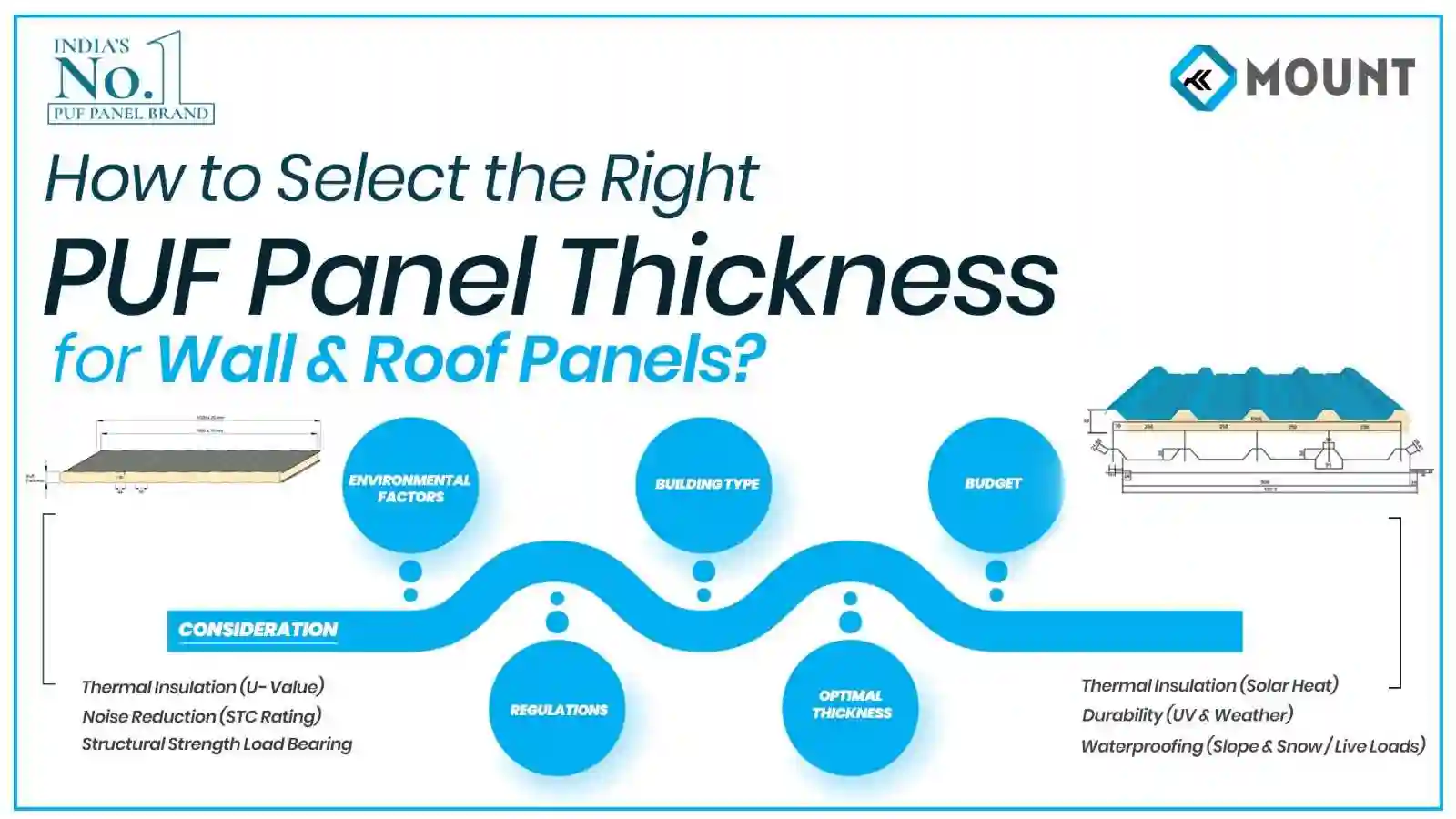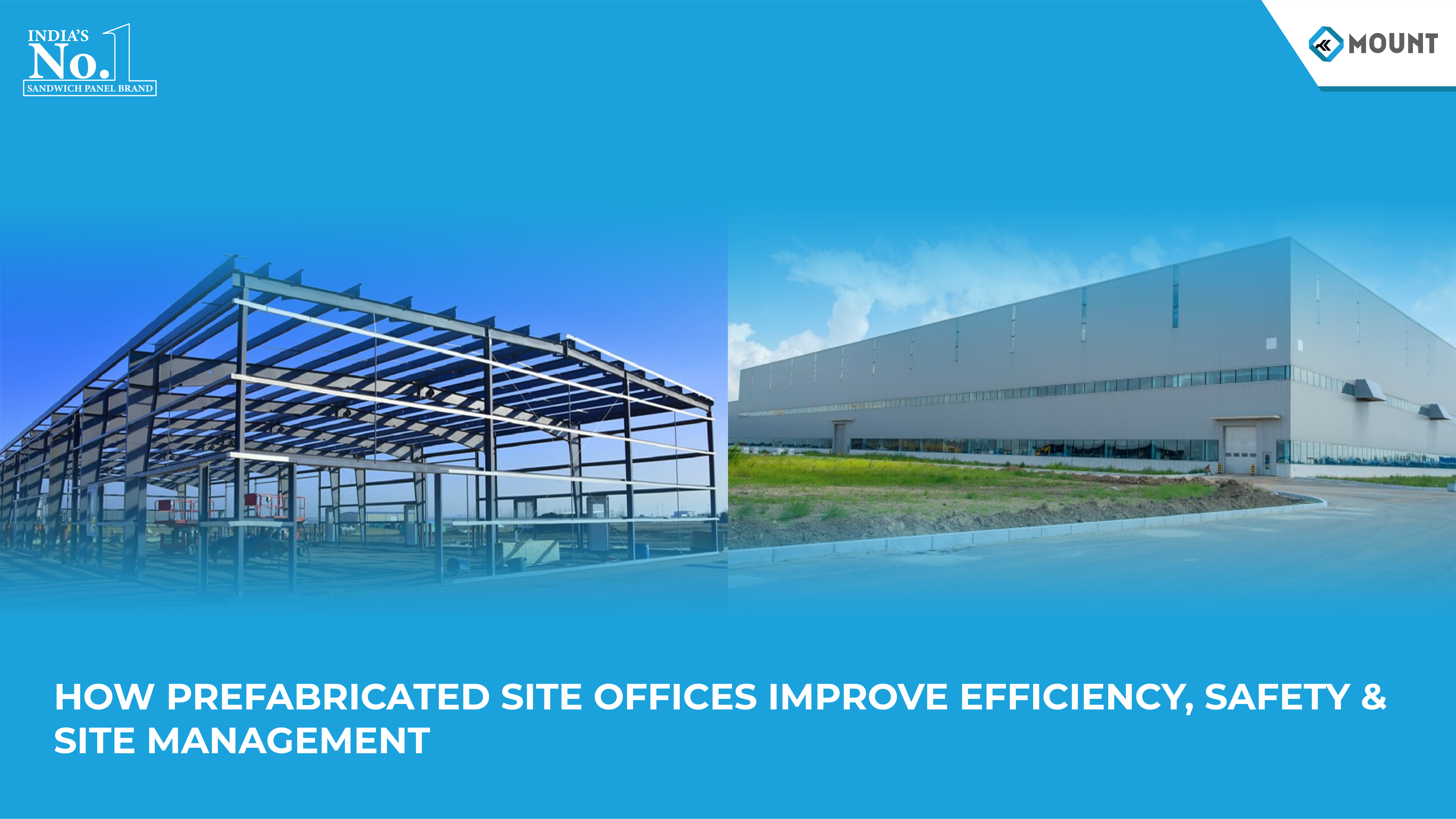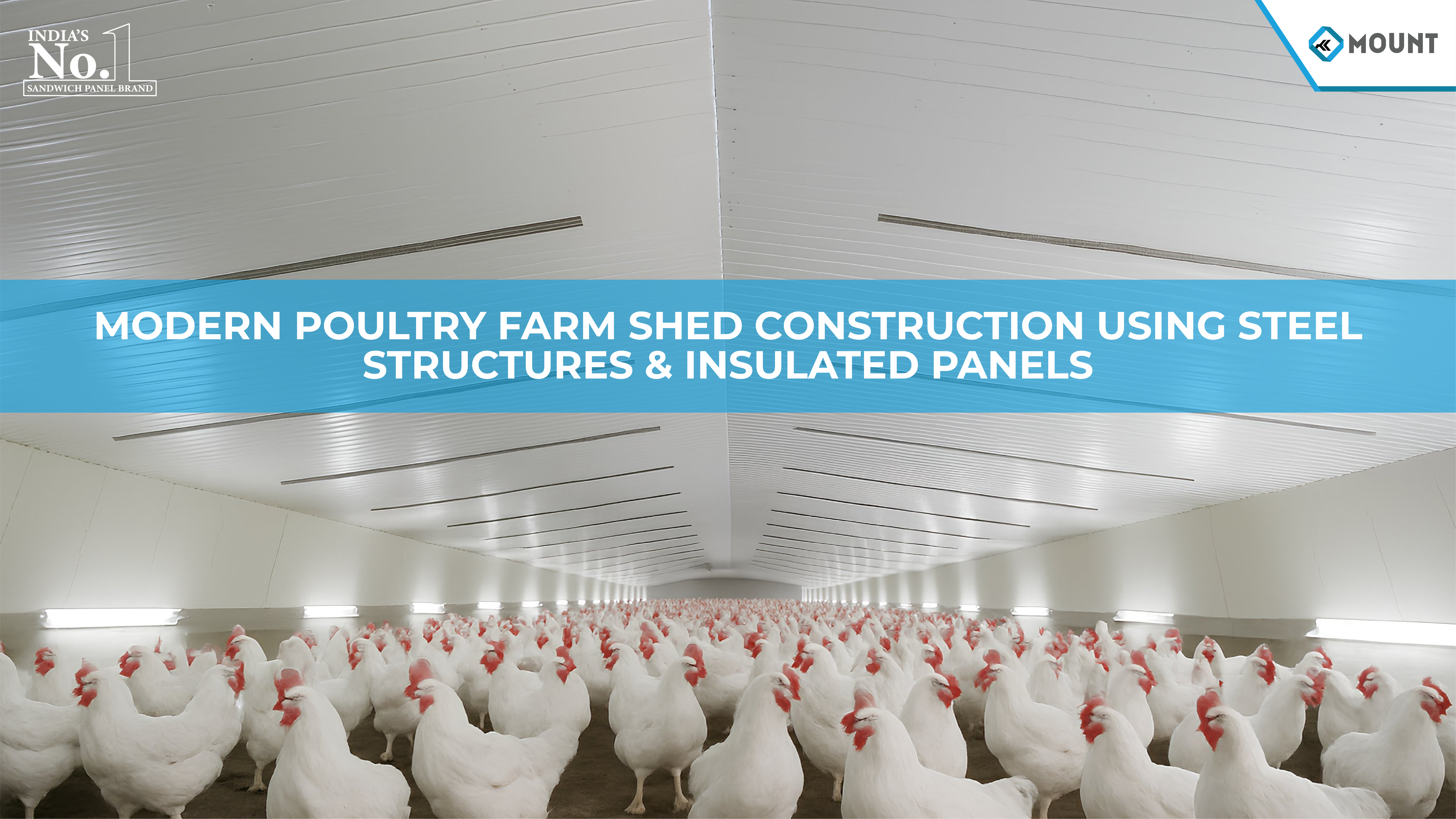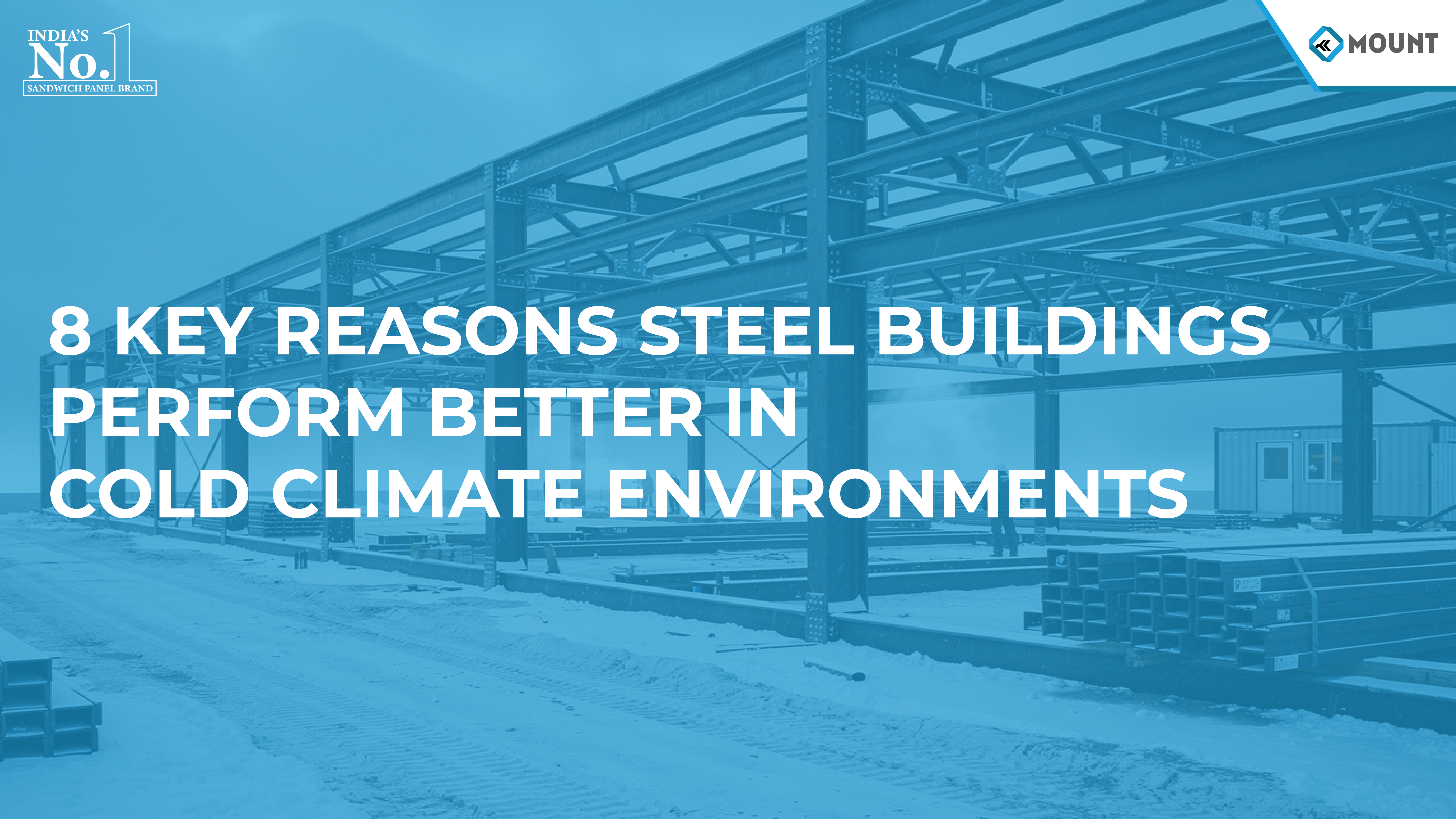
How to Select the Right PUF Panel Thickness for Wall & Roof Panels?
Choosing the right PUF panel thickness is a critical decision that directly impacts your building’s energy efficiency, structural integrity, and long-term cost savings. Whether you’re constructing a cold storage facility, industrial warehouse, or commercial building, understanding how to select appropriate PUF panels ensures optimal insulation performance and durability. Many builders and architects struggle with this decision, often overlooking crucial factors like climate conditions, building purpose, and local regulations. At Mount, we’ve helped countless clients navigate these challenges, and this comprehensive guide will walk you through everything you need to know about selecting the perfect panel thickness for your walls and roofs. Making an informed decision today can save you thousands in energy costs while ensuring maximum comfort and protection for years to come.
Understanding PUF Panel Basics
Sandwich PUF panels consist of polyurethane foam core sandwiched between two metal sheets, creating an exceptional insulation barrier. The foam core provides superior thermal resistance, while the metal layers offer structural strength and weather protection. These panels have revolutionised modern construction due to their lightweight nature, quick installation, and outstanding insulation properties. The thickness of these panels typically ranges from 20mm to 200mm, depending on application requirements. Understanding the fundamental composition helps you appreciate why thickness selection matters so significantly for your project’s success.
Key Factors Influencing Thickness Selection
Climate Considerations
Your geographical location plays a crucial role in determining the ideal wall PUF panel thickness. Buildings in extreme temperature zones require thicker panels to maintain interior comfort and reduce energy consumption. For instance, cold storage facilities in tropical regions need panels ranging from 80mm to 200mm to combat external heat effectively. Conversely, moderate climates may function efficiently with 50mm to 75mm panels. Humidity levels also influence this decision, as moisture penetration can compromise insulation effectiveness over time.
Building Type and Purpose
Different structures demand varying insulation standards. Cold storage warehouses and pharmaceutical facilities require maximum thickness, typically 100mm to 150mm, to maintain precise temperature control. Industrial buildings generally use 50mm to 100mm roofing PUF panel thickness, balancing insulation needs with structural requirements. Commercial buildings and retail spaces often opt for 40mm to 75mm panels, providing adequate comfort without excessive investment. Residential applications may use thinner options, around 20mm to 50mm, suitable for moderate insulation needs.
Energy Efficiency Requirements
Energy efficiency standards and green building certifications significantly impact thickness selection. Buildings aiming for LEED certification or similar ratings need enhanced insulation values, often requiring thicker panels. Calculating the thermal resistance (R-value) helps determine optimal thickness. Higher R-values mean better insulation, directly correlating with reduced heating and cooling costs. Working with a reputable PUF panels manufacturer like Mount ensures you receive accurate specifications matching your energy targets.
Wall vs. Roof Panel Thickness
Wall Panel Specifications
Exterior walls typically require 50mm to 100mm thickness, providing adequate protection against temperature fluctuations and weather elements. Interior partition walls may use thinner panels, around 30mm to 50mm, since they don’t face external environmental stress. The PUF panel cost increases with thickness, so balancing performance with budget becomes essential. Load-bearing considerations also matter, especially in multi-story structures where wall panels contribute to overall structural stability.
Roof Panel Requirements
PUF roofing demands special attention since roofs receive maximum solar radiation and weather exposure. Standard PUF roof sheet thickness ranges from 20mm to 200mm for most commercial and industrial applications. Flat roofs generally need thicker panels than sloped roofs due to prolonged sun exposure and water pooling risks. Additionally, roof panels must withstand wind loads, snow accumulation in certain regions, and maintenance personnel weight during inspections.
Structural Strength Considerations
Panel thickness directly correlates with load-bearing capacity and span capabilities. Thicker panels can bridge longer distances between supports, reducing the need for additional structural members. This consideration affects both initial construction costs and long-term maintenance requirements. Buildings with heavy rooftop equipment or frequent foot traffic require enhanced structural specifications. Consulting your PUF panel dealer about load calculations ensures compliance with building codes and safety standards.
Cost-Benefit Analysis
While thicker panels command higher PUF panel price, they deliver substantial long-term savings through reduced energy consumption. A comprehensive cost analysis should factor in initial investment, installation expenses, energy savings projections, and maintenance costs over the building’s lifecycle. In most cases, investing in appropriate thickness pays for itself within three to five years through energy cost reductions. Mount provides detailed cost-benefit analyses helping clients make financially sound decisions aligned with their project goals.
Common Applications of Different Thicknesses
20mm to 50mm Panels
- Residential buildings and homes
- Interior partition walls
- Moderate climate regions
- Budget-conscious projects with basic insulation needs
50mm to 75mm Panels
- Commercial buildings and offices
- Retail spaces and showrooms
- Light industrial facilities
- Standard warehouses in moderate climates
75mm to 120mm Panels
- Cold storage facilities
- Food processing plants
- Pharmaceutical manufacturing units
- Buildings in extreme climate zones
120mm to 200mm Panels
- Deep freeze storage facilities
- Specialised industrial applications
- Research laboratories requiring precise temperature control
- Extreme weather conditions buildings
Making Your Final Decision
Selecting the right thickness involves balancing multiple factors including climate, building purpose, budget constraints, and energy efficiency goals. Consulting with experienced professionals and certified PUF panels manufacturer representatives ensures you receive accurate recommendations tailored to your specific needs. Always verify that chosen specifications comply with local building codes and industry standards. Request sample installations or case studies from similar projects to validate your decision before finalizing orders.
Frequently Asked Questions
Q: What is the standard PUF panel thickness for commercial buildings?
A: Commercial buildings typically use 50mm to 80mm thickness for walls and 75mm to 100mm for roofs, depending on climate and energy efficiency requirements.
Q: How does panel thickness affect energy savings?
A: Thicker panels provide better insulation, reducing heat transfer and lowering heating/cooling costs. Each additional 25mm can improve energy efficiency by approximately 15-20%.
Q: Can I use the same thickness for walls and roofs?
A: Roofs generally require thicker panels than walls due to greater sun exposure and weather stress. Consult your manufacturer for specific recommendations.
Q: How do I calculate the required thickness for my building?
A: Consider climate zone, building purpose, desired R-value, and local building codes. Professional energy audits and manufacturer consultations provide accurate calculations.
Conclusion
Selecting the appropriate PUF panel thickness for walls and roofs is fundamental to achieving optimal building performance, energy efficiency, and long-term value. By carefully evaluating climate conditions, building purpose, structural requirements, and budget constraints, you can make informed decisions that deliver lasting benefits. Mount stands ready to support your project with premium quality panels, expert guidance, and comprehensive technical support. Remember that investing in the right thickness today ensures comfortable, efficient, and durable buildings for decades to come. Contact our team to discuss your specific requirements and receive personalized recommendations tailored to your project’s unique needs.


